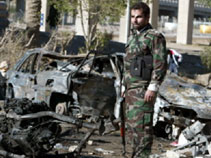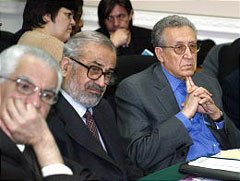|
Shiite Leader Escapes Bombing, Islamic Party Skips Polls
 |
|
Hakim escaped the assassination bid unscathed.
|
BAGHDAD,
December 27 (IslamOnline.net & News Agencies) – Iraq’s general
elections, slated for January 30, were dealt two heavy blows Monday,
December 27, as Shiite political leader Abdel Aziz Hakim escaped a
bombing attack targeting his Baghdad office while the and the main
Sunni Muslim party withdrew from the polls.
Thirteen
people were killed and dozens others were wounded when a bomber rammed
an explosives-laden car into the
Baghdad
headquarters of Hakim’s the Supreme Council for the Islamic
Revolution in Iraq (SCIRI), reported Agence France-Presse (AFP).
Hakim
escaped with his life but a number of his guards were killed.
“Thank
God, Abdel Aziz Hakim and the other members of his family are safe and
sound,” his son Mohsen told AFP in
Tehran.
He
added that four or five security guards died, while a spokesman at
Hakim's offices said three or four guards were killed and several
others wounded.
“We
had an attack against our offices here by a suicide bomber. It seems
he was trying to get through the main gate, but his vehicle
exploded,” Haitham Al-Husseini told AFP.
He
blamed toppled dictator Saddam Hussein's loyalists for the attack.
“It
was elements of the old regime and other extremists trying to stop the
political process in
Iraq.”

|
|
An officer of the Badr Organization stands close to the wreckage of vehicles following the car bombing (AFP) |
Around
Hakim's office, the former home of Saddam's deputy prime minister
Tareq Aziz
,
US
military vehicles blocked the road and soldiers stood behind razor
wire barricades.
Hakim's
followers, already grieving the deaths of more than 100 SCIRI members
since their return to
Iraq
after the April 2003 fall of Saddam, were relieved to hear their
political leader emerged unscathed.
Hakim
lived in
Iran
since the early 1980s, where he headed SCIRI's former military wing,
the Badr Organization.
Should
elections go ahead as scheduled, Shiites are expected to win the
lion's share of seats in the nation's 275-member parliament that will
be charged with writing the country's first post-Saddam constitution.
Hakim
is the top candidate on the Shiite coalition called the Unified Iraqi
Alliance running in the elections.
The
228-member list is the early election favorite, due to its endorsement
from Grand Ayatollah Ali al-Sistani, the most revered Shiite scholar
in
Iraq.
SCIRI's
founder, Ayatollah Mohammed Baqr Hakim, the brother of Abdel Aziz, was
assassinated in a car bombing that killed 83 people in the Iraqi
Shiite holy city of
Najaf
in August 2003.
Sunni
Party Withdraws

|
|
“The
security situation is very dangerous, there are six provinces (out of
18) where elections cannot take place in a normal fashion,” said Abdel
Hamid, C. |
In
another blow to the controversial elections, the Iraqi Islamic party,
the main political movement representing Sunnis, announced Monday it
would boycott the vote.
“We
are obliged to pull out,” party chief Mohsen Abdel Hamid told
reporters in
Baghdad, saying the decision was motivated by the refusal of authorities to
postpone elections for six months to ensure broader participation.
“Our
party asked on December 5 that elections be delayed for six months
using reasonable arguments,” he said referring to the worsening
security situation in the country in the run-up to the general polls.
“The
authorities concerned have refused to hear the voice of reason.”
The
party had previously presented an election list of 275 names, a number
equal to the seats up for grabs in the elections.
Abdel
Hamid was a member of the defunct Governing Council that was put in
place after the fall of Saddam.
He
has been a critic of the use of excessive force against resistance
cities, notably Fallujah, Ramadi and
Samarra.
The
influential Association of Muslim Scholars, the highest Sunni
religious authority in
Iraq, along with other Sunni civic and political figures announced in
mid-November boycotting the elections.
Abdel
Hamid, however, left the door open for a change of heart saying his
party would reconsider its decision and take part in the elections if
certain conditions are met regarding an improvement in the security
situation, more public awareness of the elections and a more
transparent role for the independent electoral commission, charged
with overseeing the process, according to AFP.
“The
security situation is very dangerous, there are six provinces (out of
18) where elections cannot take place in a normal fashion, elections
cannot be credible without the participation of all the provinces,”
he said.
“People
do not understand the political process and need at least six months
to be able to do that.”
The
statements came shortly after Iraqi interim Foreign Minister, Hoshyar
Zebari said voting could be delayed in some parts of the country due
to the fragile security situation.
Representatives
of several Iraqi parties and leading political figures have been
campaigning for a six-month delay of the vote over the increasing
deteriorating security conditions.
UN
Iraqi envoy Lakhdar Brahimi warned that holding the elections would be
impossible unless “first and foremost security improves.”
With
the withdrawal of the Iraqi Islamic party, the Sunni field would
essentially be represented by the party of senior politician Adnan
Pachachi and some independent figures.
The
New York Times reported Sunday that
Washington
was talking to Iraqi leaders about ways to guarantee Sunnis a minimum
level of top posts in the future government whatever the vote outcome.
|